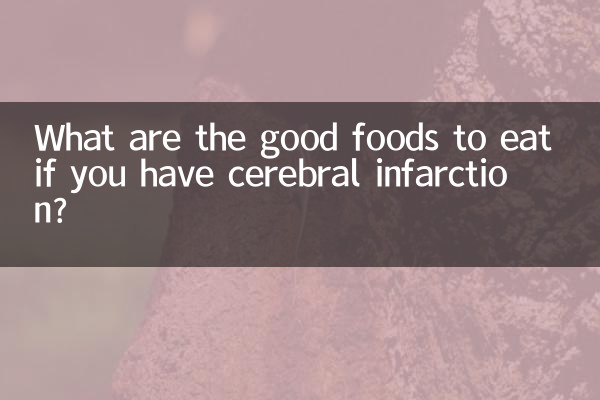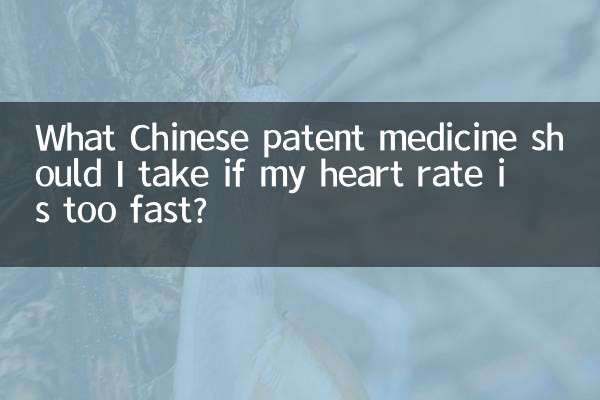What foods are good for cerebral infarction? Analysis of hot health topics in 10 days
Recently, the dietary management of patients with cerebral infarction has become one of the hotly discussed health topics on the Internet. With the arrival of the high incidence of cardiovascular and cerebrovascular diseases in winter, how to prevent and improve the sequelae of cerebral infarction through scientific diet has attracted much attention. This article will combine the recommendations of authoritative media and medical institutions in the past 10 days to compile the most practical dietary guidelines for you.
1. Core principles of diet for patients with cerebral infarction

According to the latest recommendations from the World Health Organization, the diet of patients with cerebral infarction should follow the following principles:
| principle categories | Specific content | Recommendation index |
|---|---|---|
| control heat | Daily calories should be controlled at 1800-2200 kcal | ★★★★★ |
| low salt diet | Daily salt should not exceed 5g | ★★★★★ |
| High quality protein | Daily intake of 1.2-1.5g/kg body weight | ★★★★☆ |
| dietary fiber | 25-30g daily | ★★★★☆ |
2. Recommended food list
According to the latest "Dietary Guidelines for Cardiovascular and Cerebrovascular Diseases" released by the Chinese Nutrition Society, the following foods are particularly beneficial to patients with cerebral infarction:
| food category | specific food | Efficacy description | Recommended daily amount |
|---|---|---|---|
| deep sea fish | Salmon, tuna, sardines | Rich in omega-3 fatty acids, reduce inflammation | 100-150g |
| Nuts | Walnuts, almonds, cashews | Provides healthy fats and vitamin E | 20-30g |
| whole grains | Oats, brown rice, whole wheat bread | Stabilize blood sugar and provide B vitamins | 150-200g |
| dark vegetables | spinach, broccoli, carrots | Rich in antioxidants and folate | 300-500g |
| Berries | Blueberries, strawberries, blackberries | Contains anthocyanins, protects vascular endothelium | 100-200g |
3. High-risk foods to avoid
The Department of Neurology of Peking Union Medical College Hospital recently issued a warning stating that the following foods may aggravate the condition:
| food category | risk factors | Alternative suggestions |
|---|---|---|
| Processed meat products | High sodium, nitrite | Use fresh lean meat |
| Fried food | trans fatty acids | Change to steaming method |
| high sugar drinks | Rapidly raise blood sugar | Replace with light tea or plain water |
| animal offal | high cholesterol | Choose white meat and soy products |
4. Recommendations for popular dietary therapy programs
Three dietary regimens that have attracted widespread attention on social media recently:
1.Modified Mediterranean Diet: The latest clinical research from the Affiliated Hospital of Tsinghua University shows that replacing part of the cooking oil with olive oil, combined with a large amount of vegetables and fish, can reduce the risk of recurrence of cerebral infarction by 28%.
2.Black Fungus and Red Date Soup: Traditional Chinese medicine formula has recently been confirmed by Japanese scholars to have a slight anticoagulant effect. It is recommended to take 200ml 2-3 times a week.
3.Turmeric milk: A traditional Indian drink, the anti-inflammatory effect of curcumin has been confirmed by studies in many countries. Drink 150ml of warm low-fat milk and add 1/4 teaspoon of turmeric powder before going to bed.
5. Suggestions on meal time arrangements
Director of the Nutrition Department of Ruijin Hospital Affiliated to Shanghai Jiao Tong University School of Medicine suggests:
| Meals | Calorie ratio | Food combination suggestions |
|---|---|---|
| breakfast | 30% | Whole grains + high-quality protein + a small amount of nuts |
| Lunch | 40% | Lean meat + lots of vegetables + moderate amount of whole grains |
| dinner | 25% | Easily digestible protein + fiber |
| Extra meal | 5% | Low-sugar fruit or yogurt |
6. Special precautions
1. For patients with dysphagia, food should be processed into paste or puree, and thickeners should be used if necessary.
2. Patients with diabetes need to strictly control the intake and quality of carbohydrates.
3. Patients taking anticoagulant drugs such as warfarin should keep their vitamin K intake stable and avoid severe fluctuations.
4. All dietary adjustments should be made under the guidance of a doctor and nutritionist, and the treatment plan should not be changed without authorization.
The latest data shows that scientific diet combined with standardized treatment can reduce the recurrence rate of patients with cerebral infarction by 40% and increase functional recovery by 35%. Hopefully the structured dietary advice provided in this article will help patients achieve better recovery outcomes.

check the details

check the details